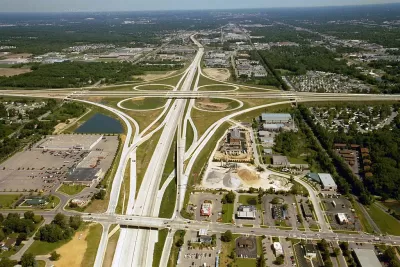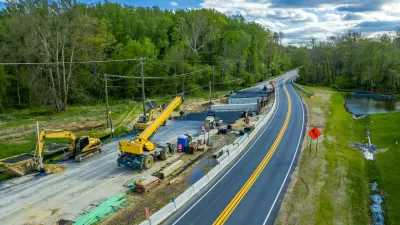One writer calls on the state to stop expanding roads and channel funding to projects that support Michigan’s sustainability goals.

In an opinion piece in Bridge Michigan, Robert Goodspeed calls on the state of Michigan to rethink its transportation spending and shift focus away from expanding freeways and roads that contribute to carbon emissions and induce more driving and congestion. Goodspeed asks, “Why do we need these if the state population has been flat for 20 years, and highways run counter to our state’s sustainability goals?”
“Right now, MDOT is spending $1.3 billion on the I-75 modernization project which will add additional commuting lanes, and a reported $269 million on a project to add a ‘flex’ lane to a 12-mile segment of I-96 in Oakland County. The $3 billion reconstruction of I-94 in downtown Detroit is also adding a lane and incurring the costs of wider bridges to accommodate it.” As Goodspeed notes, “Although some of the big freeway projects also include necessary rehabilitations, a big part of their cost are additional lanes and interchanges to make traffic flow a bit smoother.”
Goodspeed pushes back against common arguments for road expansion, writing, “In the longer term, they encourage sprawling development that empties out existing communities and gobbles up precious farmland and wilderness. One study found road improvements resulted in 20 percent more traffic.”
The op-ed ends with a strong call to action. “Gov. Gretchen Whitmer’s MI Healthy Climate Plan calls for carbon neutrality by 2050. To act on it, her administration should immediately cancel all road widening projects and modernizations resulting in more lane miles (including HOV and Flex lanes), including the capacity enhancing features I-23, I-96, and I-75 projects. Doing so would unlock millions which can be used to address the maintenance needs of existing roads and free up funds for transit alternatives.”
FULL STORY: Stop expanding the damn roads and rethink MI’s transportation future

Planetizen Federal Action Tracker
A weekly monitor of how Trump’s orders and actions are impacting planners and planning in America.

Maui's Vacation Rental Debate Turns Ugly
Verbal attacks, misinformation campaigns and fistfights plague a high-stakes debate to convert thousands of vacation rentals into long-term housing.

San Francisco Suspends Traffic Calming Amidst Record Deaths
Citing “a challenging fiscal landscape,” the city will cease the program on the heels of 42 traffic deaths, including 24 pedestrians.

Defunct Pittsburgh Power Plant to Become Residential Tower
A decommissioned steam heat plant will be redeveloped into almost 100 affordable housing units.

Trump Prompts Restructuring of Transportation Research Board in “Unprecedented Overreach”
The TRB has eliminated more than half of its committees including those focused on climate, equity, and cities.

Amtrak Rolls Out New Orleans to Alabama “Mardi Gras” Train
The new service will operate morning and evening departures between Mobile and New Orleans.
Urban Design for Planners 1: Software Tools
This six-course series explores essential urban design concepts using open source software and equips planners with the tools they need to participate fully in the urban design process.
Planning for Universal Design
Learn the tools for implementing Universal Design in planning regulations.
Heyer Gruel & Associates PA
JM Goldson LLC
Custer County Colorado
City of Camden Redevelopment Agency
City of Astoria
Transportation Research & Education Center (TREC) at Portland State University
Jefferson Parish Government
Camden Redevelopment Agency
City of Claremont





























